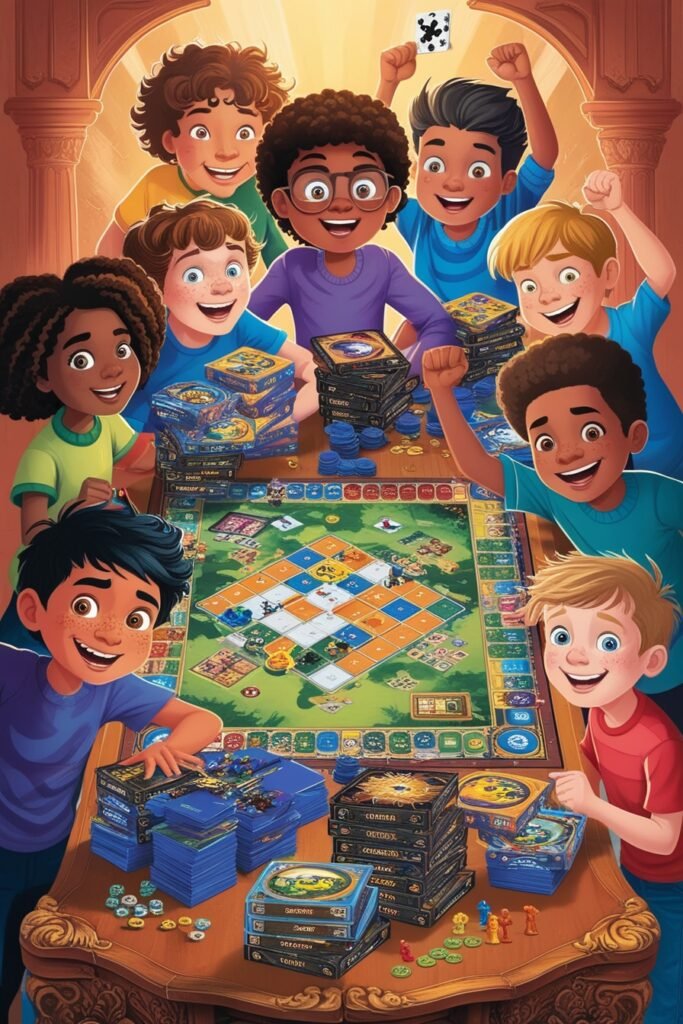It’s a common refrain from parents around the world, “I want my child to think critically, to solve problems independently, but how do I make it fun and engaging?” Well, dear reader, I’ve been in your shoes and I’ve found an answer that might surprise you – strategy games.
Yes, you read that right. The humble board game or video game can be a powerful tool in shaping young minds.
But before you rush off to dust off your old Monopoly set or download the latest app, let me explain.
Strategy games are not just about winning or losing. They’re about planning ahead, making decisions under pressure, and adapting to new situations – all vital skills in today’s fast-paced world.
Take chess for example. This ancient game of kings is a masterclass in strategic thinking.
Each move requires careful consideration of many variables – your pieces’ positions, your opponent’s strategy, potential threats and opportunities.
It’s like a mental workout that flexes the brain muscles responsible for critical thinking.
Or consider Minecraft, a popular video game among kids these days. At first glance it might seem like just another digital pastime but dig deeper and you’ll find it’s a sandbox of creativity where players must gather resources, build structures and survive against adversities.
It’s not just about clicking buttons – it’s about planning and executing survival strategies while fostering creativity. But don’t just take my word for it. Studies have shown that playing strategic games can improve cognitive functions such as problem-solving and decision-making skills.
Here are some of the best strategy games for kids that will not only entertain but also enhance their cognitive abilities.
Chess
Chess is a classic game that has stood the test of time. It teaches kids to think several moves ahead, anticipate their opponent’s strategies, and develop patience. Each piece has unique movements, requiring players to plan and execute complex tactics.
Ticket to Ride
Ticket to Ride is a board game that involves building train routes across a map. This game encourages kids to think strategically about their routes, manage resources, and adapt to changing circumstances. It’s simple enough for younger players but complex enough to keep older kids engaged.
Clue
Clue is a mystery game that pushes players to use deductive reasoning. Players must figure out who committed a crime, with what weapon, and in which room. By gathering clues and making logical inferences, kids sharpen their problem-solving skills.
Catan
Catan is a multiplayer strategy game where players collect resources and build settlements. The game teaches negotiation, resource management, and strategic planning. It’s a great way for kids to learn about the importance of trade and cooperation.
Civilization VI
Civilization VI is a turn-based video game where players build and expand an empire. The game involves managing resources, engaging in diplomacy, and planning military strategies. It’s an excellent way for kids to understand the complexities of running a civilization.
Risk
Risk is a classic board game of global domination. Players use armies to conquer territories and eliminate opponents. The game requires strategic planning, risk assessment, and tactical execution. It’s perfect for teaching kids about the balance between risk and reward.
Plants vs. Zombies
Plants vs. Zombies is a fun and engaging video game where players use plants to defend their home from zombies. The game encourages kids to think critically about their defense strategies and manage resources effectively.
Rummikub
Rummikub is a tile-based game that combines elements of rummy and mahjong. Players must create sets and runs of numbers, which requires strategic thinking and planning. It’s a great way for kids to improve their numerical and pattern recognition skills.
A 2013 study published in Current Directions in Psychological Science found that playing video games can boost children’s learning, health and social skills.
So how do you introduce strategy games into your child’s routine? Here are some tips:
1) Start simple: Don’t overwhelm them with complex games right off the bat. Start with simpler games like Connect Four or Battleship and gradually introduce more complex ones.
2) Make it a family affair: Turn game night into a family tradition. This not only makes learning fun but also strengthens familial bonds.
3) Balance is key: While strategy games are useful, it’s important to balance screen time with physical activity and other forms of learning.
4) Encourage reflection: After each game, discuss the strategies used, what worked and what didn’t. This reflection is where real learning happens.
5) Lead by example: Show your child that you’re never too old to learn. Play along with them, challenge them, let them see you strategize and sometimes fail.
It’s a great way to teach resilience and perseverance.
Remember, the goal here isn’t to raise a generation of chess grandmasters or Minecraft experts. It’s about equipping our children with the skills they need to navigate life’s challenges – critical thinking being one of the most crucial among them.
So go ahead, break out those board games or video games and watch as your child’s mind expands with every move they make!
Strategy games are more than just a source of entertainment. They offer valuable opportunities for kids to develop critical thinking, problem-solving, and decision-making skills. Whether it’s through board games or video games, incorporating strategy games into your child’s playtime can be both fun and educational.
Have you tried any of these games with your kids?
If you have any other fun ways to boost critical thinking skills in kids or any success stories from using strategy games for this purpose, do share them in the comments below!
Let’s all learn together on this journey of nurturing our little thinkers!



